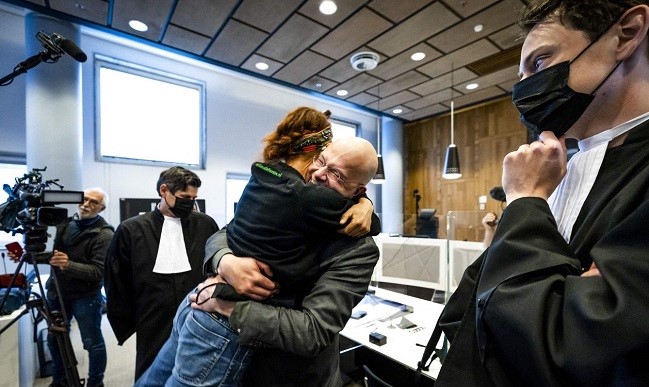A Dutch court on Wednesday, May 26, 2021 ruled that Royal Dutch Shell PLC is partially responsible for climate change and ordered the company to reduce its carbon emissions, a first-of-its-kind ruling that adds fresh pressure on oil-and-gas companies already facing heightened scrutiny from governments and investors.

The ruling, issued by the district court in The Hague and stemming from a lawsuit, found Shell must curb its carbon emissions by 45% by 2030, compared with 2019 levels. This is in line with United Nations guidance for member states aimed at preventing global temperatures rising more than 1.5 degrees Celsius above preindustrial levels.
Lawyers said the ruling, which Shell said it expects to appeal, could set a precedent in other Western jurisdictions, particularly in Europe, opening oil companies to new legal jeopardy over their carbon emissions. The court didn’t stipulate how the ordered reductions should be met, or how it might monitor or enforce its ruling.
Friends of the Earth Netherlands, a local offshoot of the global environmental non-profit network based in Amsterdam, led the civil lawsuit against Shell. It alleged the company’s production of oil and natural gas contributed to climate change, violating a so-called duty of care to those affected by it and not meeting the company’s human-rights obligations.
It asked the court to force Shell to reduce its carbon emissions. Shell’s current emissions-reduction targets are based on intensity – the amount of carbon in any unit of energy – which could see its overall emissions still rise.
The court said that Shell wasn’t in breach of its obligation to reduce carbon emissions but that there was an “imminent breach” and therefore set the reduction requirement. The case was heard in December in The Hague. Shell has dual headquarters in London and The Hague, which was why the environmental activists brought the case there.
Shell argued that climate change is a broader societal issue and that it wasn’t appropriate to ask an individual private party to reduce its carbon emissions.
On Wednesday, the company said that it was disappointed with the ruling and that it was investing billions of dollars in low-carbon energy, including electric-vehicle charging, biofuels and renewables.
“We want to grow demand for these products and scale up our new energy businesses even more quickly,” a Shell spokesman said.
The case comes as oil companies face growing scrutiny over their carbon emissions.
Activists have long accused the industry of contributing to global warming, alleging the burning of the fossil fuels they produce and sell is contributing to man-made climate change. The industry argues it has a responsibility to produce the oil and natural gas that the world needs.
More recently, governments and shareholders have also ratcheted up the pressure on the industry. Elsewhere on Wednesday, Exxon Mobil Corp. investors vote on a bid for four board seats by activist shareholders seeking a company commitment to reduce carbon emissions.
Several major oil companies have set out plans to reduce their production of fossil fuels, invest more in renewable energy and cut carbon emissions. Shell earlier this year said it would gradually reduce its oil output and expand in electricity and biofuels, while reducing the carbon intensity of the energy products it sells by 20% by 2030 and 100% by 2050.
Seeking an endorsement of that plan, Shell last week held an industry-first shareholder vote on its energy-transition strategy, which was approved by around 89% of investors.
However, a separate additional resolution calling for Shell to make more ambitious low-carbon investments and carbon-emissions reductions was supported by about 30% of shareholders. Support for the resolution, put forward by Follow This, a group of more than 6,000 shareholders in oil companies, was roughly double that of a similar resolution last year.
Wednesday’s verdict could open up a new source of pressure on oil companies, lawyers and consultants say. The Dutch case is different to other climate actions because rather than seeking damages, it seeks preventive action by forcing Shell to reduce its future carbon emissions via its corporate policy.
“This case epitomises the expanding fronts where fossil-fuel companies are coming under pressure: On top of investors and regulators demanding carbon cuts, now heavy emitters are facing censure through the courts,” said Will Nichols, head of environment and climate change at risk-analysis company Verisk Maplecroft. “We can expect this case to embolden activists and pressure groups.”
The case built on a ruling from the Netherlands supreme court in December that said the government needed to do more to prevent climate change. That case, brought by climate activist group the Urgenda Foundation, resulted in the government being ordered to reduce greenhouse-gas emissions by 25% by 2020, from 1990 levels. The government had previously targeted a 17% reduction, which the court said was insufficient to meet U.N. climate goals.
Under the 2015 Paris climate accord, which the U.S. rejoined earlier this year, governments agreed to limit global temperature rises to 2 degrees Celsius above preindustrial levels, with an ambition of 1.5 degrees.
Environmental groups welcomed Wednesday’s ruling. “This case is unique because it is the first time a judge has ordered a large polluting company to comply with the Paris Climate Agreement,” said Roger Cox, lawyer for Friends of the Earth Netherlands.
By Sarah McFarlane, The Wall Street Journal
